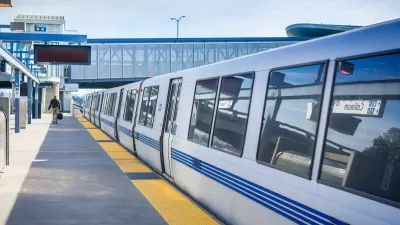MarketWatch reports on the rise of contactless smart cards in public transit and banking, and speculates that the time is ripe to put the two uses on the same card.
"'Contactless smart card technology is able to provide this common platform and can be designed to create a balance between security and commercial application,' notes Frost & Sullivan Industry Analyst Michelle Foong. 'The market in Asia Pacific is ready for this convergence in many countries, and some are already in the process of convergence to reap the benefits of multi-application.'
However, readers and cards used within the mass transit and banking markets may not always be interoperable and based on common protocols. Their backend systems and infrastructure are often not linked, making interoperability a short-term restraint for the market.
'Retailers and merchant outlets need to have a common platform of readers and terminals to accept cards from a variety of issuers, be it from transit agencies or financial institutions,' says Foong. "This has not happened in most cases and it will take some time before all the readers become interoperable.'
In order to ensure convergence between the two industries, various parties such as transit agencies, financial institutions, merchants, and card issuers need to work together to create a healthy, efficient, and interoperable eco-system. The contactless smart card infrastructure should also be developed further for this to materialize."
FULL STORY: Driving Convergence of Mass Transit and Banking Markets Using Contactless Smart Cards

Alabama: Trump Terminates Settlements for Black Communities Harmed By Raw Sewage
Trump deemed the landmark civil rights agreement “illegal DEI and environmental justice policy.”

Planetizen Federal Action Tracker
A weekly monitor of how Trump’s orders and actions are impacting planners and planning in America.

The 120 Year Old Tiny Home Villages That Sheltered San Francisco’s Earthquake Refugees
More than a century ago, San Francisco mobilized to house thousands of residents displaced by the 1906 earthquake. Could their strategy offer a model for the present?

Opinion: California’s SB 79 Would Improve Housing Affordability and Transit Access
A proposed bill would legalize transit-oriented development statewide.

Record Temperatures Prompt Push for Environmental Justice Bills
Nevada legislators are proposing laws that would mandate heat mitigation measures to protect residents from the impacts of extreme heat.

Downtown Pittsburgh Set to Gain 1,300 New Housing Units
Pittsburgh’s office buildings, many of which date back to the early 20th century, are prime candidates for conversion to housing.
Urban Design for Planners 1: Software Tools
This six-course series explores essential urban design concepts using open source software and equips planners with the tools they need to participate fully in the urban design process.
Planning for Universal Design
Learn the tools for implementing Universal Design in planning regulations.
Clanton & Associates, Inc.
Jessamine County Fiscal Court
Institute for Housing and Urban Development Studies (IHS)
City of Grandview
Harvard GSD Executive Education
Toledo-Lucas County Plan Commissions
Salt Lake City
NYU Wagner Graduate School of Public Service





























